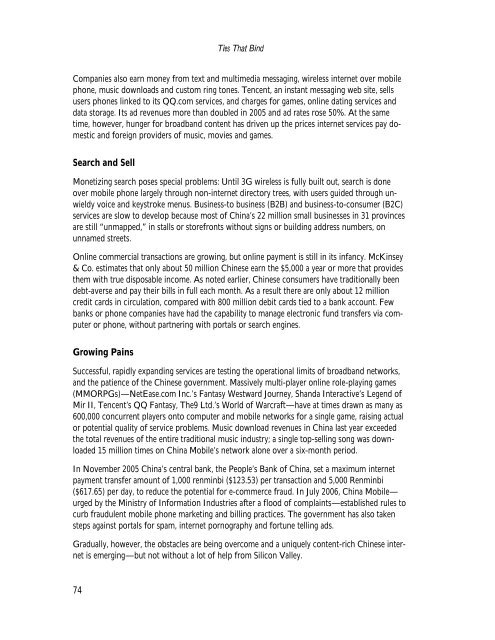Ties That Bind - Bay Area Council Economic Institute
Ties That Bind - Bay Area Council Economic Institute
Ties That Bind - Bay Area Council Economic Institute
Create successful ePaper yourself
Turn your PDF publications into a flip-book with our unique Google optimized e-Paper software.
74<br />
<strong>Ties</strong> <strong>That</strong> <strong>Bind</strong><br />
Companies also earn money from text and multimedia messaging, wireless internet over mobile<br />
phone, music downloads and custom ring tones. Tencent, an instant messaging web site, sells<br />
users phones linked to its QQ.com services, and charges for games, online dating services and<br />
data storage. Its ad revenues more than doubled in 2005 and ad rates rose 50%. At the same<br />
time, however, hunger for broadband content has driven up the prices internet services pay domestic<br />
and foreign providers of music, movies and games.<br />
Search and Sell<br />
Monetizing search poses special problems: Until 3G wireless is fully built out, search is done<br />
over mobile phone largely through non-internet directory trees, with users guided through unwieldy<br />
voice and keystroke menus. Business-to business (B2B) and business-to-consumer (B2C)<br />
services are slow to develop because most of China’s 22 million small businesses in 31 provinces<br />
are still “unmapped,” in stalls or storefronts without signs or building address numbers, on<br />
unnamed streets.<br />
Online commercial transactions are growing, but online payment is still in its infancy. McKinsey<br />
& Co. estimates that only about 50 million Chinese earn the $5,000 a year or more that provides<br />
them with true disposable income. As noted earlier, Chinese consumers have traditionally been<br />
debt-averse and pay their bills in full each month. As a result there are only about 12 million<br />
credit cards in circulation, compared with 800 million debit cards tied to a bank account. Few<br />
banks or phone companies have had the capability to manage electronic fund transfers via computer<br />
or phone, without partnering with portals or search engines.<br />
Growing Pains<br />
Successful, rapidly expanding services are testing the operational limits of broadband networks,<br />
and the patience of the Chinese government. Massively multi-player online role-playing games<br />
(MMORPGs)—NetEase.com Inc.’s Fantasy Westward Journey, Shanda Interactive’s Legend of<br />
Mir II, Tencent’s QQ Fantasy, The9 Ltd.’s World of Warcraft—have at times drawn as many as<br />
600,000 concurrent players onto computer and mobile networks for a single game, raising actual<br />
or potential quality of service problems. Music download revenues in China last year exceeded<br />
the total revenues of the entire traditional music industry; a single top-selling song was downloaded<br />
15 million times on China Mobile’s network alone over a six-month period.<br />
In November 2005 China’s central bank, the People’s Bank of China, set a maximum internet<br />
payment transfer amount of 1,000 renminbi ($123.53) per transaction and 5,000 Renminbi<br />
($617.65) per day, to reduce the potential for e-commerce fraud. In July 2006, China Mobile—<br />
urged by the Ministry of Information Industries after a flood of complaints—established rules to<br />
curb fraudulent mobile phone marketing and billing practices. The government has also taken<br />
steps against portals for spam, internet pornography and fortune telling ads.<br />
Gradually, however, the obstacles are being overcome and a uniquely content-rich Chinese internet<br />
is emerging—but not without a lot of help from Silicon Valley.








